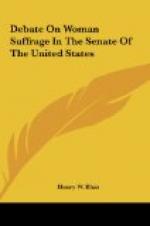composed of seventy-six of the most intelligent
and liberty-loving men of the nation, shall not pass
the resolution by a two-thirds vote, I really believe
it will do so if the friends on this committee
and on the floor of the Senate will champion the
measure as earnestly as if it were to benefit
themselves instead of their mothers and sisters.
Gentlemen, I thank you for
this hearing granted, and I hope the
telegraph wires will soon
tell us that your report is presented,
and that a discussion is inaugurated
on the floor of the Senate.
ARGUMENTS OF THE WOMAN-SUFFRAGE
DELEGATES BEFORE THE COMMITTEE ON
THE JUDICIARY OF THE UNITED
STATES SENATE, JANUARY 23, 1880.
THE COMMITTEE ON THE JUDICIARY,
UNITED STATES SENATE, Friday,
January 23, 1880.
The committee assembled at half-past 10 o’clock a.m.
Present: Mr. Thurman,
chairman; Mr. McDonald, Mr. Bayard, Mr.
Davis, of Illinois; Mr. Edmunds.
Also Mrs. Zerelda G. Wallace, of Indiana; Mrs. Elizabeth L. Saxon, of Louisiana; Mrs. Mary A. Stewart, of Delaware; Mrs. Lucinda B. Chandler, of Pennsylvania; Mrs. Julia Smith Parker, of Glastonbury, Conn.; Mrs. Nancy R. Allen, of Iowa; Miss Susan B. Anthony, of New York; Mrs. Sara A. Spencer, of the city of Washington, and others, delegates to the twelfth Washington convention of the National Woman-Suffrage Association, held January 2l and 22, 1880.
The CHAIRMAN. Several members of the committee are unable to be here. Mr. Lamar is detained at his home in Mississippi by sickness; Mr. Carpenter is confined to his room by sickness; Mr. Conkling has been unwell; I do not know how he is this morning; and Mr. Garland is chairman of the Committee on Territories, which has a meeting this morning that he could not omit to attend. I do not think we are likely to have any more members of the committee than are here now, and we will hear you, ladies.
REMARKS BY MRS. ZERELDA G. WALLACE, OF INDIANA.
Mrs. WALLACE. Mr. Chairman and gentlemen of the committee, it is scarcely necessary to recite that there is not an effect without a cause. Therefore it would be well for the statesmen of this nation to ask themselves the question, what has brought the women from all parts of this nation to the capital at this time: the wives and mothers, and sisters; the home-loving, law-abiding women? What has been the strong motive that has taken us away from the quiet and comfort of our own homes and brought us before you to-day? As an answer partly to that question, I will read an extract from a speech made by one of Indiana’s statesmen, and probably if I tell you his name his sentiments may have some weight with you. He found out by experience and gave us the benefit of his experience, and it is what we are rapidly learning:
“You can go to meetings; you can




